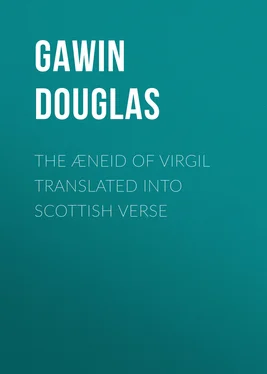Gawin Douglas - The Æneid of Virgil Translated Into Scottish Verse
Здесь есть возможность читать онлайн «Gawin Douglas - The Æneid of Virgil Translated Into Scottish Verse» — ознакомительный отрывок электронной книги совершенно бесплатно, а после прочтения отрывка купить полную версию. В некоторых случаях можно слушать аудио, скачать через торрент в формате fb2 и присутствует краткое содержание. Жанр: foreign_poetry, Поэзия, foreign_antique, foreign_prose, на английском языке. Описание произведения, (предисловие) а так же отзывы посетителей доступны на портале библиотеки ЛибКат.
- Название:The Æneid of Virgil Translated Into Scottish Verse
- Автор:
- Жанр:
- Год:неизвестен
- ISBN:нет данных
- Рейтинг книги:4 / 5. Голосов: 1
-
Избранное:Добавить в избранное
- Отзывы:
-
Ваша оценка:
- 80
- 1
- 2
- 3
- 4
- 5
The Æneid of Virgil Translated Into Scottish Verse: краткое содержание, описание и аннотация
Предлагаем к чтению аннотацию, описание, краткое содержание или предисловие (зависит от того, что написал сам автор книги «The Æneid of Virgil Translated Into Scottish Verse»). Если вы не нашли необходимую информацию о книге — напишите в комментариях, мы постараемся отыскать её.
The Æneid of Virgil Translated Into Scottish Verse — читать онлайн ознакомительный отрывок
Ниже представлен текст книги, разбитый по страницам. Система сохранения места последней прочитанной страницы, позволяет с удобством читать онлайн бесплатно книгу «The Æneid of Virgil Translated Into Scottish Verse», без необходимости каждый раз заново искать на чём Вы остановились. Поставьте закладку, и сможете в любой момент перейти на страницу, на которой закончили чтение.
Интервал:
Закладка:
Na thing tharof ȝhe sall in Caxtoun fynd.
The saxt buke eyk, he grantis, that wantis haill,
And, for tharof he vnderstude nocht the taill,
He callis it fenȝeit, and nocht for to beleif;
Sa is all Virgill perchans, for by his leif
Juno nor Venus goddessis neuer war,
Mercure, Neptune, Mars, nor Jupiter,
Of Fortune eik, nor hir necessite,
Sik thingis nocht attentik ar, wait we,
Nor ȝit admittis that quent philosophy
Haldis sawlys hoppys fra body to body,
And mony thingis quhilkis Virgill dyd rehers,
Thocht I thame write furthfollowand hys vers.
Nor Caxtoun schrynkis nocht siclyke thyngis to tell
As nocht war fabill, bot the passage to hell;
But trastis weill, quha that ilke saxt buke knew,
Virgill tharin ane hie philosophour hym schew,
And, vnder the clowdis of dyrk poetry,
Hyd lyis thar mony notabill history.
For so the poetis, be ther crafty curys,
In similitudes, and vndir quent figuris,
The suythfast materis to hyde and to constreyn;
All is nocht fals, traste weill, in cace thai feyn,
Thair art is so to mak thar warkis fair,
As in the end of Virgill I sall declair.
Was it nocht eik als possibill Eneas,
As Hercules or Theseus tyll hell to pas?
Quhilk is na gabbyng suythly, nor na lie,
As Jhone Bocas in the genealogie
Of Goddys declarys, and lyke as ȝhe may reid
In the recolles of Troy, quha lest tak hed.
Quha wait gyf he in visioun thydder went
By art magike, sorcery, or enchantment,
And with his faderis sawle dyd speke and meyt,
Or in the lyknes with sum other spreit,
Lyke as the spreit of Samuell, I ges,
Raysit to King Saul was by the Phitones?
I will nocht say all Virgill beyn als trew,
But at syk thyngis ar possibill this I schew;
Als in tha days war ma illusionys,
By dewillich warkis and coniurationis,
Than now thar beyn, so doith clerkis determ;
For, blissit be God, the faith is now mair ferm.
Enewch tharof, now will I na mor sayn,
Bot onto Caxtoun thus I turn agane.
The namys of pepill or citeis beyn so bad
Put by this Caxtoun, that, bot he had beyn mad,
The flude of Touyr for Tibir he had nocht write;
All men may knaw thar he forvayt quyte.
Palente the cite of Evander kyng,
As Virgill playnly makis rehersyng,
Stude quhar in Rome now stant the cheif palyce;
This sam buke eyk, in mair hepit malyce,
On the self ryver of Touyr says playnly
Eneas dyd hys cyte edify.
Thus ay for Tibir Touyr puttis he,
Quhilk mony hundreth mylis syndry be;
For sykkyrly, les than wys authoris leyn,
Ene saw nevir Touyr with hys eyn;
For Touyr diuidis Grece from Vngary,
And Tibir is cheif flude of Italy;
Touyr is kend a grayn of that ryver
In Latyn hecht Danubium or Hyster,
Or gyf it be Tanais he clepis sa,
That flude diuidis Europ from Asia.
In lyke wys eik this Caxtoun, all invane,
Crispina clepis Sibilla Cumane,
That in the text of Virgill, trastis ws,
Hait Deiphebe douchtir of Glawcus,
Quhilk was Eneas convoyar to hell.
Quhat suld I langar on hys errouris dwell?
Thai beyn so playn, and eik sa mony fald,
The hundreth part tharof I leif ontald.
The last sax bukis of Virgill all inferis,
Quhilk contenys strang batalis and werys,
This ilk Caxtoun so blaitly lattis ourslip,
I hald my tung for schame, bytand my lyp.
The gret afferis of athir host and array,
The armour of Eneas fresch and gay,
The quent and curyus castis poeticall,
Perfyte symylitudis, and exempilis all
Quharin Virgill beris the palm of lawd,
Caxtoun, for dreid thai suld hys lippis scald,
Durst nevir twich. Thus schortly for the namys,
A twenty devill way fall hys wark atanys,
Quhilk is na mair lyke Virgill, dar I lay,
Than the nycht owle resemblis the papyngay.
Quharfor ȝou gentill redaris I besich
Traste on na wys at this my wark be sich,
Quhilk dyd my best, as the wyt mycht atteyn,
Virgillis versys to follow and no thing feyn.
Ȝhe worthy noblys redis my wark for thy,
And cast this other buke on syde far by,
Quhilk, vndir cullour of sum strange Franch wycht,
Sa franchly leys, oneith twa wordis gais rycht.
I nold ȝhe trast I said this for dispyte;
For me lyst with nane Inglis bukis flyte,
Na with na bogill nor browny to debait,
Nowder ald gaistis nor spretis ded of lait,
Nor na man will I lakkyn nor dispys,
My warkis till authorys be sik wys,
Bot twichyng Virgillis honour and reuerens,
Quha euer contrary, I mon stand at defens;
And bot my buke be fundyn worth sik thre,
Quhen it is red, do warp it in the see,
Thraw it in the fyre, or rent it euery crum,
Twichand that part lo heir is all and sum.
Syne I defend and forbiddis euery wight
That can nocht spell thar Pater Noster rycht,
Fortill correct or ȝit amend Virgill,
Or the translatar blame in hys wlgar stile;
I knaw quhat payn was to follow hym fut hait,
Albeit you think my sayng intricate.
Traste weill, to follow a fixt sentens or mater
Is mair practik, deficill, and far strater,
Thocht thyne engyne beyn eleuate and hie,
Than forto write all ways at liberte.
Gif I had nocht bene to a boundis constrenyt,
Of my bad wyt perchance I couth haue fenyt
In ryme a ragment twys als curyus,
Bot nocht be twenty part so sentencyus.
Quha is attachit ontill a staik, we se,
May go na ferthir bot wreil about that tre,
Rycht so am I to Virgillis text ybund,
I may nocht fle, les than my falt befund;
For thocht I wald transcend and go besyde,
His wark remanys, my schame I may nocht hyde;
And thus I am constrenyt, als neir I may,
To hald hys vers and go nane other way,
Les sum history, subtell word, or the ryme
Causith me mak digressioun sum tyme.
So thocht in my translatioun eloquens skant is,
Na lusty cast of oratry Virgill wantis;
My studyus brayn to comprehend his sentens
Leit me nevir taist hys flude of eloquens;
And thus forsuyth becaus I was nocht fre,
My werk is mair obscur and gros per de,
Quharof, God wait, Virgill has na wyte,
Thocht myne be blunt, hys text is maist perfyte.
And ȝit persave I weill, be my consait,
The kyng of poetis ganys nocht for rurall estait,
Nor hys fresch memor for bowbardis; he or scho
Quha takis me nocht go quhar thai haue ado:
The sonnys lycht is neuer the wers, traiste me,
All thocht the bak hys brycht bemys doith fle.
Greyn gentill ingynys, and breistis curageus,
Sik ar the pepill at ganys best for ws;
Our werk desiris na lewyt rebalddaill,
Full of nobilite is thistory all haill,
For, euery vertu belangand a nobill man,
This ornate poet, bettir than ony can,
Payntand discryvis in person of Eneas;
Not forto say, sikane Eneas was,
Ȝit than by hym perfytly blasons he
All wirschip, manhed, and nobilite,
With euery bonte belangand a gentill wycht,
Ane prynce, ane conquerour, or a valȝeand knycht;
In luffis cuyr eneuch heir sall ȝhe fynd;
And schortly, Virgill left na thing behynd
That mycht hys volume illummyn or crafty mak;
Reid quha hym knawys, I dar this vndertak,
Als oft as ȝe hym reid, full weill I wait,
Ȝhe fynd ilke tyme sum mery new consait.
Thoght venerabill Chauser, principal poet but peir,
Hevynly trumpat, orlege, and reguler,
In eloquens balmy, cundyt, and dyall,
Mylky fontane, cleir strand, and roys ryall,
Of fresch endyte, throu Albion island braid,
In hys legend of notabill Ladeis, said
That he couth follow word by word Virgill,
Wisar than I may faill in lakar stile;
Sum tyme the text mon haue ane expositioun,
Sum tyme the cullour will caus a litill additioun,
And sum tyme of a word I mon mak thre,
In witnes of this term oppetere ;
Eik, weill I wait, syndry expositouris seir
Makis on a text sentens diuers to heir,
As thame apperis, according thar entent,
And for thar part schawis ressonys euident.
All this is ganand, I will weill it swa be;
Bot a sentens to follow may suffice me:
Sum tyme I follow the text als neir I may,
Sum tyme I am constrenyt ane other way.
Besyde Latyn our langage is imperfite,
Quhilk in sum part is the caus and the wyte
Quhy that of Virgillis vers the ornate bewte
Intill our tung may nocht obseruyt be;
For thar be Latyn wordis, mony ane,
That in our leyd ganand translatioun has nane,
Les than we mynys thar sentens and grauyte,
And ȝit scant weill exponyt; quha trewis nocht me
Let thame interprit animal and homo ,
With many hundreth other termys mo,
Quhilkis in our langage suythly, as I weyn,
Few men can tell me cleirly quhat thai meyn;
Betweyn genus , sexus , and species
Diuersite in our leid to seik I ces;
For obiectum and subiectum alsswa
He war expert couth fynd me termys twa,
Quhilkis ar als ryfe amangis clerkis in scuyll
As evir fowlis plungit in laik or puyll.
Logicianys knawys heirin myne entent,
Vndir quhais boundis lurkis mony strange went,
Quharof the proces, as now, we mon lat be.
Bot ȝit twychyng our tungis penuryte,
I meyn into compar of fair Latyn,
That knawyn is maste perfite langage fyne,
I mycht also, percace, cum lyddir speid
For arbor and lignum intill our leid
To fynd different proper termys twane,
And tharto put circumlocutioun nane;
Rycht so, by about spech oftyn tymys
And semabill wordis we compile our rymys.
God wait, in Virgill ar termys mony a hundir
Fortill expone maid me a felloun blundir;
To follow alanerly Virgilis wordis, I weyn,
Thar suld few vndirstand me quhat thai meyn;
The bewte of his ornate eloquens
May nocht al tyme be kepit with the sentens.
Sanct Gregor eik forbyddis ws to translait
Word eftir word, bot sentens follow al gait.
Quha haldis, quod he, of wordis the properteis
Full oft the verite of the sentens fleys.
And to the sammyn purpos we may apply
Horatius in hys art of poetry;
Pres nocht, says he, thou traste interpreter,
Word eftir word to translait thi mater.
Lo he reprevis, and haldis myssemyng,
Ay word by word to reduce ony thing.
I say nocht this of Chauser for offens,
But till excus my lewyt insufficiens;
For as he standis beneth Virgill in gre,
Vndir hym alsfer I grant my self to be.
And netheles into sum place, quha kend it,
My mastir Chauser gretly Virgill offendit.
All thoch I be to bald hym to repreif,
He was fer baldar, certis, by hys leif,
Sayand he followit Virgillis lantern toforn,
Quhou Eneas to Dydo was forsworn.
Was he forsworn? Than Eneas was fals;
That he admittis, and callys hym traytour als.
Thus, wenyng, allane Ene to haue reprevit,
He has gretly the prynce of poetis grevit.
For, as said is, Virgill dyd diligens,
But spot of cryme, reproch, or ony offens,
Eneas for to loif and magnyfy;
And gif he grantis hym maynsworn fowlely,
Than all hys cuyr and crafty engyne gais quyte,
Hys twelf ȝheris laubouris war nocht worth a myte.
Certis, Virgill schawys Ene dyd na thing,
From Dydo of Cartage at hys departyng,
Bot quhilk the goddis commandit hym beforn;
And gif that thar command maid hym maynsworn,
That war repreif to thar diuinyte,
And na reproch onto the said Enee.
Als in the first, quhar Ilioneus
Spekis to the queyn Dido, says he nocht thus,
Thar curs by fait was set tyll Italy?
Thus mycht scho not pretend na just caus quhy,
Thocht Troianys eftir departis of Cartage,
Sen thai befor declaryt hir thar vayage.
Reid the ferd buke quhar queyn Dido is wraith,
Thar sal ȝhe fynd Ene maid nevir aith,
Promyt, nor band with hir fortill abyde:
Thus hym tobe maynsworn may nevir betyde,
Nor nane onkyndnes schew forto depart
At the bydding of Jove with reuthfull hart,
Sen the command of God obey suld all,
And vndir his charge na wrangwys deid may fall.
Bot sikkyrly, of resson, me behufis
Excus Chauser fra all maner repruffis,
In lovyng of thir ladeis lylly quhyte
He set on Virgill and Eneas this wyte;
For he was evir, God wait, all womanis frend.
I say na mair, bot, gentil redaris heynd,
Lat all my faltis with this offens pas by.
Thou prynce of poetis, I the mercy cry,
I meyn thou kyng of kyngis, lord etern,
Thou be my muse, my gydar, and laid stern,
Remittyng my trespas and euery mys
Throu prayer of thy moder queyn of blys!
Afald godhed, ay lestyng, but discrepans,
In personys thre, equale of a substans,
On the I call and Mary Virgyn myld;
Calliope nor payan goddis wild
May do to me na thing bot harm, I weyn,
In Criste is all my traste and hevynnys queyn.
Thou virgyn moder and madyn be my muse,
That nevir ȝit na synfull lyst refus
Quhilk the besocht deuotly for supple;
Albeit my sang to thy hie maieste
Accordis nocht, ȝit condiscend to my write,
For the sweit liquor of thy pappis quhite
Fosterit that prynce, that hevynly Orpheus,
Grond of all gude, our Saluyour Ihesus.
Bot forthirmor, and lawar to discend,
Forgeif me Virgill gif I the offend,
Pardon thy Scolar, suffir hym to ryme,
Sen thou was bot ane mortal man sum tyme;
In cace I faill haue me not at disdenȝe,
Thocht I be lewit, my leill hart can nocht fenȝe:
I sall the follow, suld I therfor haue blame,
Quha can do bettir, sa furth in Goddis name.
I schrynk nocht anys correkkit for tobe
With ony wight grundit on cherite,
And glaidly wald I baith inquire and leir,
And till ilke cunnand wight la to my myne eyr;
Bot laith me war, but owther offens or cryme,
Ane brimell body suld intertrike my ryme.
Thocht sum wald swer that I the text haue vareit,
Or that I haue this volume quyte myscareit,
Or threpe playnly that I come nevir neir hand it,
Or at the wark is wers than evir I fand it,
Or ȝit argue Virgill stude weill befor,
As now war tyme to schift the werst our scor;
Ellis haue I said, thar may be na compar
Betwix his versis and my stile wlgar.
All thocht he stant in Latyn maist perfyte,
Ȝit stude he nevir weill in our tung endyte,
Les than it be by me now at this tyme.
Gyf I haue falȝeit, baldly reprufe my ryme;
Bot first, I pray ȝou, grape the mater cleyn,
Reproche me nocht quhill the wark be ourseyn.
Beis not our studyus to spy a moyt in myne E,
That in ȝour awyn a ferry boyt can nocht se,
And do to me as ȝhe wald be done to.
Now hark schirris, thar is na mair ado;
Quha list attend, gevis audiens, and draw neir,
Me thocht Virgill begouth on this maner:
I the ilk vmquhile that in the small ait reid
Tonyt my sang; syne fra the woddis ȝeid,
And feildis about taucht tobe obesand,
Thocht he war gredy, to the bissy husband,
Ane thankfull wark maid for the plewchmanis art:
Bot now the horribill stern dedys of Mart,
The batalys and the man I will discryve.
Читать дальше
Интервал:
Закладка:
Похожие книги на «The Æneid of Virgil Translated Into Scottish Verse»
Представляем Вашему вниманию похожие книги на «The Æneid of Virgil Translated Into Scottish Verse» списком для выбора. Мы отобрали схожую по названию и смыслу литературу в надежде предоставить читателям больше вариантов отыскать новые, интересные, ещё непрочитанные произведения.
Обсуждение, отзывы о книге «The Æneid of Virgil Translated Into Scottish Verse» и просто собственные мнения читателей. Оставьте ваши комментарии, напишите, что Вы думаете о произведении, его смысле или главных героях. Укажите что конкретно понравилось, а что нет, и почему Вы так считаете.












